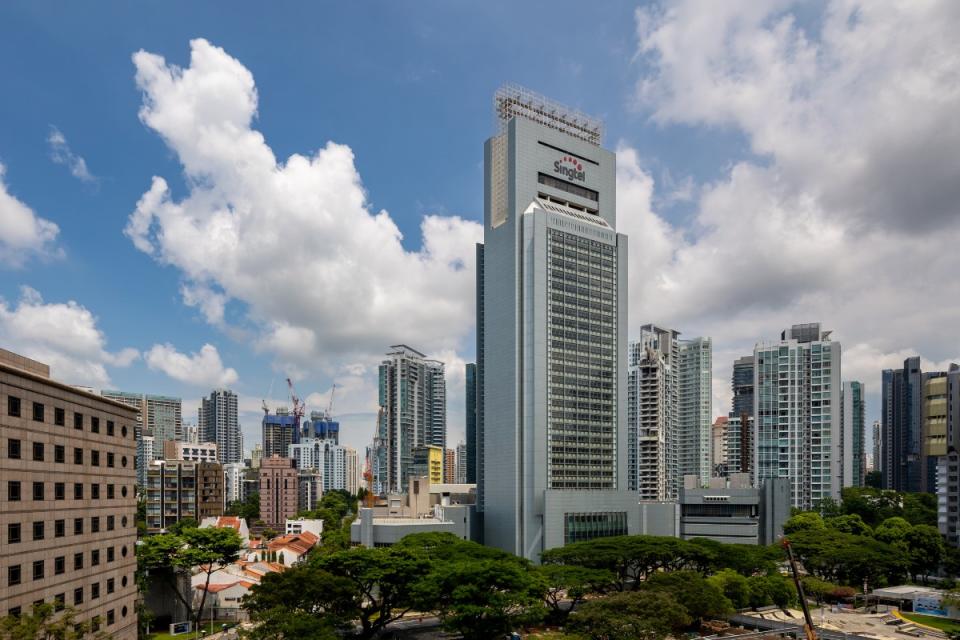Following refreshed emissions targets, Singtel unveils environmental strategy at inaugural sustainability forum

The telco’s new “4D strategy” builds on Singtel’s renewed targets, announced in January and validated by the SBTi.
Singtel has unveiled its environmental sustainability strategy, which includes plans to certify all new buildings to Green Mark Platinum, the highest level of certification under the Building and Construction Authority’s (BCA) scheme.
This includes Singtel’s Comcentre headquarters along Orchard Road, where redevelopment works are expected to be complete by end-2028. When ready, the building will be “100% carbon-neutral”, says Singtel group chief executive officer Yuen Kuan Moon on March 27.
In addition, Singtel has raised the height of all its base stations to “at least 5m above sea level” to reduce flood risk, adds Yuen.
At the telco’s inaugural Singtel LEAD thought leadership forum, Yuen unveiled the telco’s “4D strategy”: to defend its infrastructure, decarbonise its operations through electrification, dematerialise unnecessary waste and deliver sustainable value by influencing its supply chain to take climate action.
The new strategy builds on Singtel’s renewed targets, announced in January and validated by the Science-Based Targets initiative (SBTi). By 2030, Singtel aims to cut group-wide Scope 1 and 2 direct and indirect greenhouse gas emissions by 55%, with 2023 as a base year.
The group also aims to cut Scope 3 third-party emissions by 40% by the end of the decade, using 2023 as the base year.
Singtel set its first SBTi-aligned targets in 2017, aiming to cut absolute Scope 1 and 2 emissions across its Singapore and Australian operations by 42% from its 2015 base year by 2030. As at end-2023, the group has already reduced its Scope 1 and 2 emissions by more than 20%.
In Yuen’s opening address, he revealed that Scope 3 emissions make up 89.05% of Singtel’s group-wide emissions as at end-FY2023, or March 2023. Scope 1 and 2, meanwhile, contributed just 0.16% and 10.8% respectively towards Singtel’s emissions portfolio.
Compared to accounting for Scope 1 and 2 emissions, Yuen says measuring Scope 3 emissions is “less straightforward”, citing a “lack of representative data” from Singtel’s value chain. “We need more accurate calculation methods; we need to work more across our value chain to improve this.”
In July 2023, the telco brought forward its net-zero target to 2045 from 2050. With the updated pledge, Singtel is the only Asian telco with a net-zero target ahead of 2050.
Environmental initiatives
Since 2015, Singtel has invested $150 million to mitigate its environmental impact. As at end-2023, solar photovoltaic panels deployed across Singtel’s facilities in Singapore have allowed it to generate more than 2,100 megawatt-hour (MWh) annually.
Singtel has also secured about 700,000 MWh of renewable-backed energy from 2025 to 2029, enough to meet a fifth of the energy needed across its Singapore and Australia operations. The telco says it is growing the proportion of renewable energy use across Singapore and Australia to 50% by 2030.
Following a successful trial involving 21 electric vehicles in 2022, Singtel will convert its fleet of more than 150 vehicles in Singapore to electric models by 2028. This will cut its Scope 1 emissions by 450 tonnes annually.
On material waste, Singtel introduced half-size SIM cards in 2021, and has since introduced e-SIM on its subsidiary GOMO and tourist prepared services, and plans to introduce this for other mobile segments.
In addition, Singtel will no longer give out complimentary bags at its retail shops.
There is “no time to waste” if we want to avoid the worst effects of the climate crisis, says Yuen. “This is why we’re pushing ourselves to go further and faster, with more aggressive SBTi climate commitments and bringing forward our net-zero target from 2050 to 2045. Our teams are fully engaged in pursuing these ambitious objectives through a comprehensive environmental strategy, supported by progressive programmes.”
As at 10.33am, shares in Singtel are trading flat at $2.53.
See Also:
Click here to stay updated with the Latest Business & Investment News in Singapore
UOB frontline staff further trained to prevent and combat scams
Singtel denies report it is 'exploring options' over Australia unit
Get in-depth insights from our expert contributors, and dive into financial and economic trends

 Yahoo Finance
Yahoo Finance 